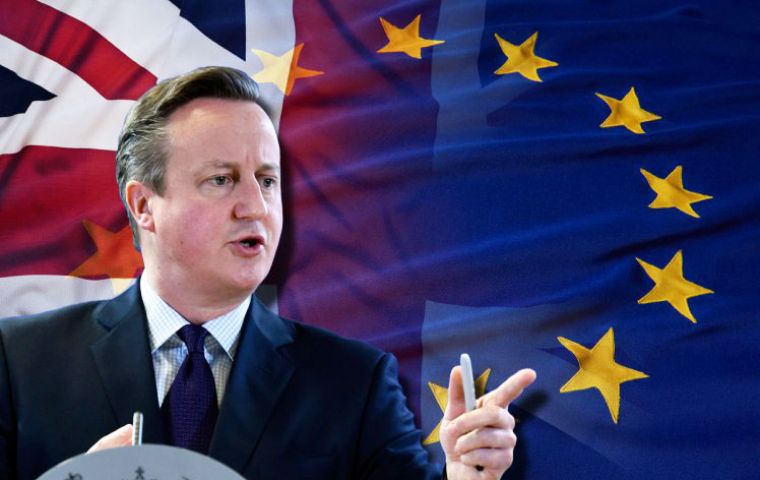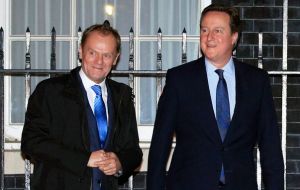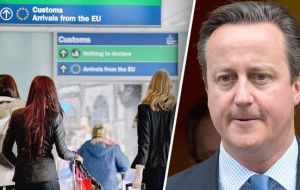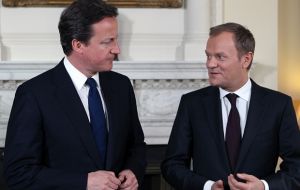MercoPress. South Atlantic News Agency
EU and Cameron optimistic a deal on UK's relationship could be reached this week
 An early deal would allow Mr. Cameron to call a referendum on the UK's EU membership before the summer holidays.
An early deal would allow Mr. Cameron to call a referendum on the UK's EU membership before the summer holidays.  Cameron and Tusk met over dinner at Downing Street on Sunday and hope to finalize a package of measures for the EU leaders' summit on 18 and 19 February.
Cameron and Tusk met over dinner at Downing Street on Sunday and hope to finalize a package of measures for the EU leaders' summit on 18 and 19 February.  As part of UK membership negotiations, Cameron has proposed denying in-work benefits to all EU migrants until they had been in the UK for four years.
As part of UK membership negotiations, Cameron has proposed denying in-work benefits to all EU migrants until they had been in the UK for four years.  The prime minister's spokesman said Mr. Cameron and Mr. Tusk had had a “productive working dinner”
The prime minister's spokesman said Mr. Cameron and Mr. Tusk had had a “productive working dinner” European Council president Donald Tusk left a meeting on Sunday evening with Prime Minister David Cameron declaring there is “no deal” yet over a renegotiation of the UK's relationship with the EU. It had been planned that any proposed deal could be put to other EU leaders on Monday, ahead of a February summit.
An early deal would allow Mr. Cameron to call a referendum on the UK's EU membership before the summer holidays. Mr. Cameron and Mr. Tusk met over dinner at Downing Street on Sunday.
However, Mr. Cameron later said on Twitter that it had been a “good meeting” and that Mr. Tusk had agreed to another 24 hours of talks before publishing the draft UK renegotiation text. According to an EU source, Mr. Tusk's negotiating team stayed in Downing Street after the meeting.
After the 24-hour period has passed, the team will assess the situation and decide whether to table a draft agreement or not.
The pair hope to finalize a package of measures for the EU leaders' summit on 18 and 19 February. As part of his attempts to renegotiate the UK's membership of the EU, Mr. Cameron had proposed denying in-work benefits to all EU migrants until they had been in the UK for four years.
He said stopping those migrants from claiming tax credits - income supplements paid to those in low-paid work - would reduce high levels of immigration to the UK.
Mr. Cameron is now seeking assurances that an alternative proposed “emergency brake” on welfare payments to EU migrants could be triggered immediately after the referendum, in a bid to reassure critics it would be effective in slowing the influx of foreign workers.
EU officials have suggested the UK could use the brake for up to four years, but would have to prove public services were under excessive strain. Under current plans, it could be imposed within three months of the UK applying, if other EU states agreed.
The prime minister's spokesman said Mr. Cameron and Mr. Tusk had had a “productive working dinner”, adding that “progress has been made in the past 48 hours, but we are not there yet”.
He also said the European Commission had tabled a text saying that the UK meets the criteria for triggering an emergency brake on the payment of in-work benefits to EU migrants, describing this development as a “significant breakthrough”.
This means Mr. Cameron could deliver on his commitment to restrict in-work benefits to migrants for four years, he added. But the spokesman acknowledged that there were other areas where there was more work to do.
PM Cameron's four main aims of negotiation:
Integration: Allowing Britain to opt out from the EU's founding ambition to forge an “ever closer union” so it will not be drawn into further political integration.
Benefits: Restricting access to in-work and out-of-work benefits to EU migrants. Specifically, ministers want to stop those coming to the UK from claiming certain benefits and housing until they have been resident for four years.
Sovereignty: Giving greater powers to national parliaments to block EU legislation. The UK supports a “red card” system allowing member states to scrap, as well as veto, unwanted directives.
Eurozone v the rest: Securing an explicit recognition that the euro is not the only currency of the European Union, to ensure countries outside the eurozone are not disadvantaged. The UK also wants safeguards that it will not have to contribute to eurozone bailouts.




Top Comments
Disclaimer & comment rules-

-

-

Read all commentsMr Cameron won't get much out of a hopelessly divided EU but will present it as a major victory with huge concessions.
Feb 01st, 2016 - 09:41 am 0Hopefully UK voters will see through the charade and vote without fear to leave the EU.
They'll throw him a bone, a worthless one. I'm voting to leave as I trust most UK voters will...regardless of what he comes back with!
Feb 01st, 2016 - 10:00 am 0Camoron has some of Obumma about him.
Feb 01st, 2016 - 11:06 am 0Promising alternative to the peer group attempting to 'lead' the Conservatives but once I read his 'CV' I realised he was a wanker and so it has proven.
He will lie to the electorate just like Heath did.
IF he offers a straight referendum he will lose, so expect the worst for the electorate to choose from.
Attempting to frighten people to vote NO will backfire big-time on him, Osbourne and The Canuk.
Commenting for this story is now closed.
If you have a Facebook account, become a fan and comment on our Facebook Page!